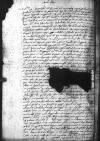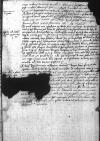List #3908
[Ioannes DANTISCUS] do Stanisław HOZJUSZ (HOSIUS)Braunsberg (Braniewo), 1545-01-29
Regest polski:
Dantyszek dziękuje za listy Hozjusza przesłane razem z kopiami [listów i pozwów dla gdańszczan], na które częściowo już odpowiedział listem z 9 stycznia przesłanym przez Maurycego. Jego powrotu spodziewa się w ciągu najbliższych godzin. Z zadowoleniem przeczytał w liście Hozjusza, że syndyk [miasta Gdańska, Konrad Lagus] niczego nie uzyskał poza kopią pisma i że nie udało mu się uzyskać terminu dla rozpatrzenia apelacji [w sprawie Pucka]. Constellatus [Johann von Werden] i gdańszczanie nie będą z tego zadowoleni. Według przesłanej kopii pozwu pozwana została rada [miasta Gdańska], więc na podstawie zawartej w nim formuły można byłoby zobowiązać ją do odpowiedzi na wszystkie zarzuty, w tym dotyczące uprawnień przejętych przez miasto Gdańsk po komendatorze [Zakonu krzyżackiego] i mające związek ze stanem posiadania króla. Wskazane w piśmie konkretne osoby król może do siebie wezwać w dowolnym momencie. O tej kwestii, podobnie jak o innych, o których należałoby napisać, Dantyszek ma nadzieję szerzej się wypowiedzieć podczas osobistego spotkania.
Dantyszek prosi o uzgodnienie z komisarzem [generalnym franciszkanów konwentualnych, Marco de la Torre] kwestii swojego zatrzymania się [u niego w Krakowie]. Jednocześnie prosi o zachowanie jego przyjazdu w tajemnicy, którą chciałby utrzymać z dość istotnych przyczyn.
Spodobała mu się odpowiedź udzielona przez Hozjusza osobie, która prosiła o radę, w jaki sposób gdańszczanie mogą pojednać się z królem. Co tutaj doradzono w tej sprawie, Danyszek napisał ostatnio w liście do Hozjusza albo, jeśli dobrze pamięta, do Samuela Maciejowskiego. Jeśli król potraktuje sprawę poważnie, przyniesie to korzyść. Jeśli zaś będzie postępować tak jak poprzednio, [dalej tekst częściowo uszkodzony].
Dantyszek porusza sprawę listu cesarza [dotyczącego podległości Gdańska Rzeszy]. [Dalej tekst niejasny, częściowo uszkodzony] Deklarację Gdańszczan, że cesarz jest ich prawdziwym panem, król zaś „zum schuchhernn”, zrozumie każdy, kto potrafi być jak Edyp [tj. rozwiązywać zagadki].
Dantyszek odpowiada na uwagę Hozjusza, że jest potrzebny [na sejmie walnym, bo nikt nie zna spraw pruskich lepiej od niego], uznając ją za grzecznościową. Zapewnia jednak, że przybędzie zgodnie ze swym obowiązkiem wobec władcy, choć wiązać się to będzie dla niego ze znacznym uszczerbkiem majątkowym i wielkim wysiłkiem.
Ostatnio w Elblągu Dantyszek wraz z innymi [członkami rady Prus Królewskich] rozstrzygnął wiele spraw sądowych. Pozostającemu pod jego opieką sierocie [Georgowi Schultzowi] przywrócono prawo apelacji do króla, której zaniechali jego opiekunowie. Termin postępowania wyznaczono na pierwszy dzień sądowy po święcie św. Jana Chrzciciela [24 czerwca 1545]. Cornelius [von Stadenn] wraz z żoną oraz jego przeciwnik [Petrus Brandt] zobowiązali się osiągnąć porozumienie bez udziału świadków przed wiosennym sejmem [Prus Królewskich].
W innych sprawach Dantyszek napisze po powrocie Maurycego, którego natychmiast odeśle z powrotem.
Dotąd nic nie wiadomo, nad czym sąsiad [Albrecht Hohenzollern] naradza się ze szwagrem (bratem żony) [Adolfem, księciem Holsztynu-Gottorp] i bratankiem [Albrechtem Alcybiadesem]. Constellatus [Johann von Werden] udał się tam [do Królewca] przed kilkoma dniami i podobno teraz także tam przebywa.
W postscriptum Dantyszek prosi o wiadomości z dworu. Chce wiedzieć, czy sąsiad [Albrecht Hohenzollern] powiadomi o swoich gościach przez posła lub listownie. Oprócz tego interesują go poczynania Constellatusa [Johanna von Werden] oraz przebieg sejmu walnego. Krążą pogłoski, że Constellatus razem z sąsiadem i jego gośćmi zajmują się kwestią małżeństw królewien [Zofii, Anny i Katarzyny Jagiellonek] oraz że trwają przygotowania do wyjazdu na dwór razem ze szwagrem [Adolfem, księciem Holsztynu]. Jest on podobno lekkoduchem, wielbicielem błazeństw i pijakiem. Uzyskał trzecią część księstwa Holsztynu. Ten, który podaje się za króla Danii [Chrystian III] i inny jego brat [Jan, książę Holsztynu-Gottorp] posiadają pozostałe dwie, lepsze części. Dantyszek prosi o informacje w poruszonych kwestiach, a także w innych, aby mógł dobrze przygotowany przybyć na dwór.
Rękopiśmienne podstawy źródłowe:
| ||||||
Tekst + aparat krytyczny + komentarz Zwykły tekst Tekst + komentarz Tekst + aparat krytyczny Ekscerpty dotyczące podróży Dantyszka
Doctori
Venerabilis etc.
Gratissimae mihi fuerunt cum exemplis missis Dominationis Vestrae cf.
Dominatio Vestra pro sua in me benevolentia agat interea cum reverendo domino
Responsum Dominationis Vestrae, quod illi dedit, qui written over a⌈aii written over a⌉ consilium petivit, qua in re
Quod de litteris
Ceterum, ut scribit Dominatio Vestra in iis persona mea opus esse, multa mihi pro sua benevolentia mihi tribuens, quae in me non agnosco hidden by binding⌈[co]co hidden by binding⌉, nescio, quid a me praestari possit, quod non posset vel obiter aliquis. Nihilosecius, quicquid in me est,
 AAWO, AB, D. 7, f. 11r meo iudicio temere quidem etc.
AAWO, AB, D. 7, f. 11r meo iudicio temere quidem etc.
Alia, quae hinc sunt scribenda sunt paper damaged⌈[enda sunt]enda sunt paper damaged⌉, post reditum
Quid cum hospitibus sororio et nepote on the margin⌈
Postscript:
Si quid interea erit, quod me ex aula scire oporteat, praesertim si


